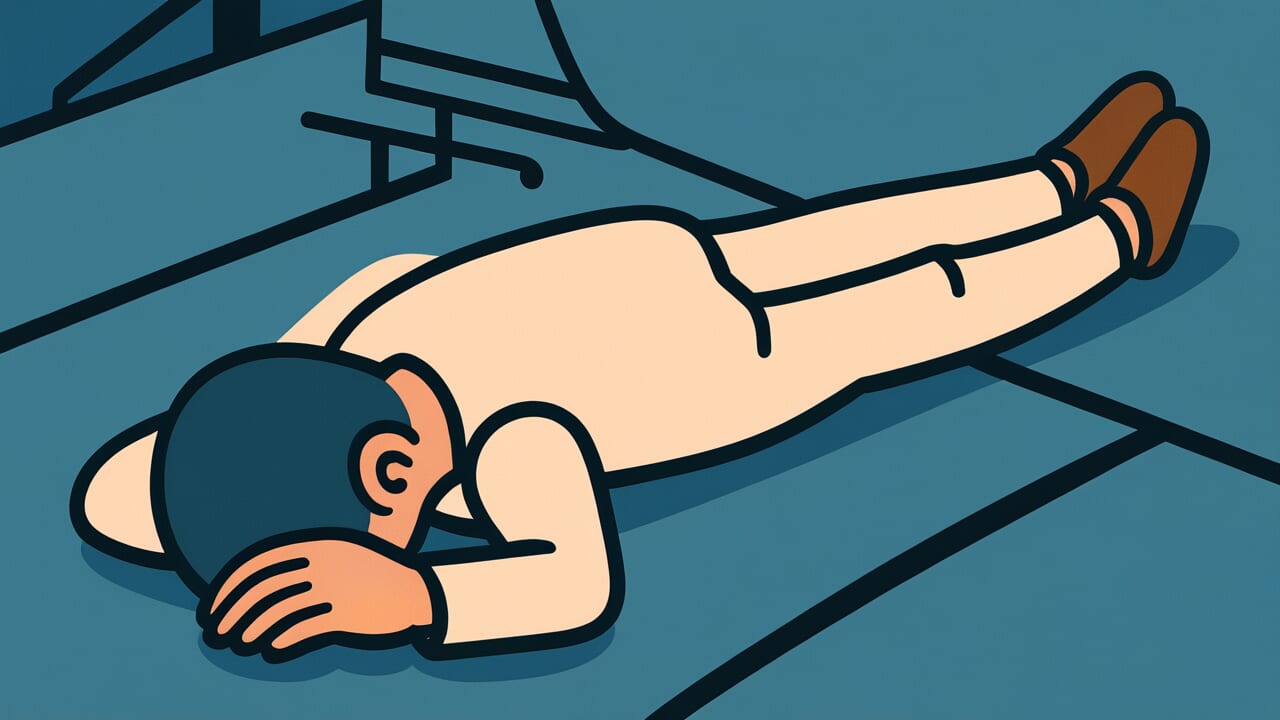How to Read “No one has ever fallen while lying down”
Nete ite koronda tameshi nashi
Meaning of “No one has ever fallen while lying down”
“No one has ever fallen while lying down” means you won’t fail as long as you stay in a safe position. When you’re lying down, you’re in the most stable state possible, so falling is impossible.
This obvious fact illustrates a simple truth: if you don’t take risks, you won’t fail.
This proverb is often used when someone fears failure and hesitates to try something new. It carries a hint of irony or warning: “If you don’t want to fail, just do nothing. But then you won’t gain anything either.”
It’s also used to encourage people who are too afraid of failure to take action.
Today, this proverb is commonly quoted to emphasize the importance of taking on challenges. Staying in a safe place means no failure, but it also means no growth or success.
This is the core lesson people understand from these words.
Origin and Etymology
No clear written records explain the origin of this proverb. However, we can make interesting observations from how the phrase is constructed.
“Lying down” is the safest and most stable position for humans. Your center of gravity is low, your body is horizontal, and you’re not trying to move anywhere.
“Falling” only happens when you’re standing and walking. This proverb was born from extremely logical observation.
During the Edo period, this expression likely emerged from accumulated everyday wisdom among common people. People back then witnessed many failures in business and relationships caused by taking unnecessary risks.
From these experiences, they needed to express the truth that “doing nothing means no failure” in a way everyone could understand.
By using the everyday action of “lying down” as an example, they created a lesson anyone could grasp intuitively without complex explanations. This simplicity is why the proverb has been passed down through generations.
Simple yet profound, it captures the essence of life. This is why it continues to be used today.
Usage Examples
- The new business might fail, but as they say, no one has ever fallen while lying down—if you do nothing, you’ll never succeed either
- He’s too afraid of failure to try anything, but no one has ever fallen while lying down—he’s just playing it safe
Universal Wisdom
“No one has ever fallen while lying down” brilliantly captures a fundamental human contradiction. It’s the eternal conflict between our instinct for safety and our desire for growth.
Everyone fears failure. We don’t want to be embarrassed, hurt, or lose something valuable. This emotion is rooted in our survival instinct and is completely natural.
Yet humans also have a desire to achieve something beyond their current state. We constantly swing between these two opposing feelings.
Our ancestors deeply understood this human nature. That’s why they didn’t simply preach “go challenge yourself.” Instead, they presented an undeniable fact: “If you lie down, you won’t fall.”
Yes, it’s true—lying down prevents falling. But is that really the life you want?
This proverb has endured because it forces us to face a fundamental life choice. Will you give up all possibilities in exchange for complete safety?
Or will you accept the risk of falling and stand up to walk forward?
This question is a universal theme that all humans face, regardless of era or culture.
When AI Hears This
The human brain has a strange quirk. People strongly fear failing by doing something, but they don’t fear failing by doing nothing as much.
Psychology calls this “omission bias.”
Look at the investment world, for example. People who buy stocks and lose money deeply regret it: “I shouldn’t have bought that.” But when they do nothing and inflation gradually reduces their savings’ value, the same amount of loss doesn’t bother them as much.
Behavioral economics research shows that people feel about twice as much pain from a loss caused by their action as from the same loss caused by inaction.
What’s interesting about this proverb is that it exploits this cognitive bias. Yes, you won’t fall if you lie down. But bedridden people lose 3 to 5 percent of their muscle strength per day, and eventually they really can’t walk.
In other words, while gaining the visible safety of “not falling,” you’re definitely taking the less visible risk of “losing the ability to walk.”
The essence of risk management isn’t aiming for zero risk. It’s weighing the risk of action against the risk of inaction and choosing the more valuable option.
Ironically, this proverb teaches us about the “risk of doing nothing”—the risk humans most often overlook.
Lessons for Today
This proverb teaches modern people that “doing nothing” is also a choice in life, and that choice comes with a price.
Modern society tends to judge failure harshly. On social media, only success stories stand out while failures are hidden. This makes us fear failure too much and want to stay in safe places.
But is that really okay?
The important thing is not to take this proverb as simple encouragement to “just go challenge yourself.” Instead, use it as a guide for making conscious choices.
If you’re not challenging something right now, ask yourself: Are you truly choosing to “lie down,” or are you just afraid?
If you’re consciously choosing rest, that’s a respectable choice. But if fear is holding you back, why not start with a small step?
If you fall, you can get up again. That experience is what will help you grow.



Comments